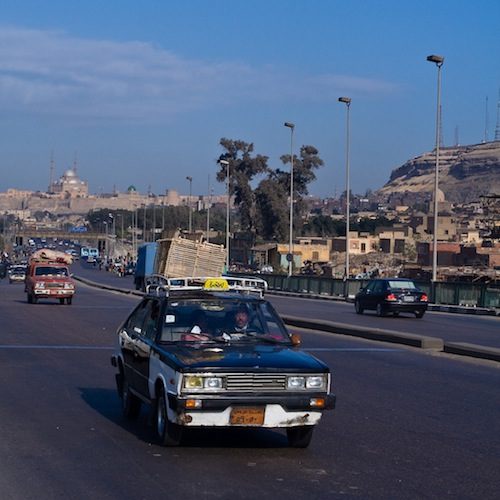One night in March, a few months before I left New York City for Cairo, I took a taxi from Chelsea to my apartment near the Gowanus Canal.
The bearded driver wanted to chat, so we did—rather, he did. He began to tell me the story of Mohammed. Once we arrived at my house, he handed me a book, “A Brief Illustrated Guide to Understanding Islam.” Its cover featured an open Qu’ran zooming around the planet against a fluorescent backdrop of stars. Inside, it explained the similarity between embryos, leeches, and blood clot. Into my suitcase it went.
Everything You’ll Ever Need
Egyptian cabs are, in essence, an extension of the driver’s home, and hospitality follows suit. Drivers may offer you cigarettes, tissues, tea, shawarma sandwiches, old 25-piastre notes. A friend of mine once had a driver who was drinking orange juice with a straw out of a plastic grocery bag. Mind you, there was no carton of juice in this bag—he was drinking it straight up, the bag acting as an ad hoc carafe. Ever the host, he offered my friend a sip.
Close Enough
“Can you take me to Tahrir?” I asked a driver one day in something resembling Arabic but more toward Québécois French. “Darfur?” he said. “Sure.”
Dweller in Truth
The white shell of a Cairo cab holds a museum of kitsch. The most popular and puzzling cabin adornment is the faux-fur dashboard cover, which traps the dust and heat that characterize Cairo’s air and yet still manages to swath a third of the city’s dashboards.
Other cabs have window curtains or, on rare occasions, panels of mesh where the window should be. There are fuzzy dice that read “I love you” on each side, Malcolm X air fresheners (ostensibly not Malcolm X-scented), teddy bear seat covers, stickers that say “No Girls,” and BMW decals in case you didn’t already notice that the car is a Hyundai.
The Way Forward
My friend and I bullet down a Cairo highway, our lives in the hands of a buff, mustachioed driver. His name is Mr. H. He is going so fast he misses the exit we told him to take. Doubtless, we think, he’ll go to the next exit, turn around, and start over. But Mr. H has alternative plans. He pulls over to the side of the highway—at this point, we’re on a busy overpass that would be six lanes if Cairo highways had lanes—and starts driving in reverse. Very quickly. For half a mile, until we’re on the off-ramp, alive, breathless at the feat that has just been accomplished. Mr. H, though he cracked a smile when he first shifted into reverse, remains nonplussed.
Dreams of the Rehabilitation Period
Egyptian cabs are cheap. I was warned before arriving that cabbies are adept rip-off artists, but when an average ride, including rip-off, costs $3, no blood is lost. There is, however, a way to circumvent extortion: jokes. Especially political jokes. My friend Sam tells a good one on our way to Ramses Station one sunny morning.
“So Mubarak’s lying on his death bed,” Sam says to our slick-haired driver. “And he brings his trusted adviser to his bedside. ‘Adviser,’ Mubarak says. When I die, please make sure my son Gamal becomes president.’
‘Yes, President Mubarak,’ the adviser says.
Mubarak calls to the adviser again. ‘Adviser,’ Mubarak says. ‘What will happen to the people of Egypt when I die?’
‘Do not worry, President Mubarak,’ the adviser says. ‘The people of Egypt are strong. They will eat stones to survive if they have to.’
Mubarak nods. ‘Adviser,’ he says. ‘One more thing. Please make sure my son Alaa owns the stone company.’”
We laugh and laugh, the driver doubling over while he weaves through watermelon trucks, overstuffed minibuses, and motorcycles carrying families of five. He doesn’t rip us off. We leave a big tip instead, for Egypt—five pounds, or 85 cents.



